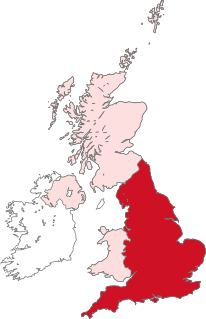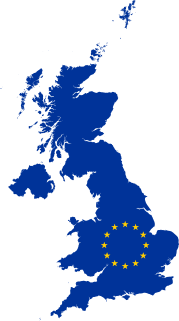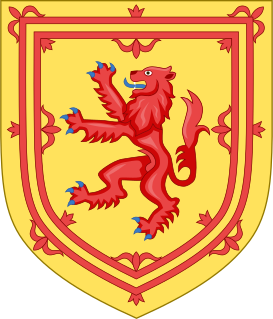
Euroscepticism, also spelled as Euroskepticism or EU-scepticism, means criticism of the European Union (EU) and European integration. It ranges from those who oppose some EU institutions and policies, and seek reform, to those who oppose EU membership and see the EU as unreformable. The opposite of Euroscepticism is known as pro-Europeanism, or European Unionism.

The United Kingdom is a unitary state with devolution that is governed within the framework of a parliamentary democracy under a constitutional monarchy in which the monarch, currently Queen Elizabeth II, is the head of state while the Prime Minister of the United Kingdom, currently Boris Johnson, is the head of government. Executive power is exercised by the British government, on behalf of and by the consent of the monarch, and the devolved governments of Scotland, Wales and Northern Ireland. Legislative power is vested in the two chambers of the Parliament of the United Kingdom, the House of Commons and the House of Lords, as well as in the Scottish and Welsh parliaments. The British political system is a two party system. Since the 1920s, the two dominant parties have been the Conservative Party and the Labour Party. Before the Labour Party rose in British politics, the Liberal Party was the other major political party, along with the Conservatives. While coalition and minority governments have been an occasional feature of parliamentary politics, the first-past-the-post electoral system used for general elections tends to maintain the dominance of these two parties, though each has in the past century relied upon a third party, such as the Liberal Democrats, to deliver a working majority in Parliament. A Conservative–Liberal Democrat coalition government held office from 2010 until 2015, the first coalition since 1945. The coalition ended following parliamentary elections on 7 May 2015, in which the Conservative Party won an outright majority of seats, 330 of the 650 seats in the House of Commons, while their coalition partners lost all but eight seats.

The UK Independence Party is a Eurosceptic, right-wing populist political party in the United Kingdom. The party reached its greatest level of success in the mid-2010s, when it gained two members of Parliament and was the largest party representing the UK in the European Parliament. The party is currently led by Neil Hamilton.

The National Union of Rail, Maritime and Transport Workers is a British trade union covering the transport sector. It is currently presided by Michelle Rodgers and its current general secretary is Mick Lynch.

Gerard Joseph Batten is a British politician who served as the Leader of the UK Independence Party (UKIP) between 2018 and 2019. He was a founding member of the party in 1993, and served as a Member of the European Parliament (MEP) for London between 2004 and 2019.

Alan Sked is a Scottish eurosceptic academic notable for having founded the Anti-Federalist League and its successor the UK Independence Party (UKIP). He is Professor Emeritus of International History at the London School of Economics and has stood as a candidate in several parliamentary elections.

English independence is a political stance advocating secession of England from the United Kingdom. Support for secession of England has been influenced by the increasing devolution of political powers to Scotland, Wales and Northern Ireland, where independence from the United Kingdom is a prominent subject of political debate.

Euroscepticism in the United Kingdom is a continuum of belief ranging from the opposition to certain political policies of the European Union to the complete opposition to the United Kingdom’s membership of the European Union. It has been a significant element in the politics of the United Kingdom (UK). A Eurobarometer survey of EU citizens in 2009 showed that support for membership of the EU was lowest in the United Kingdom, alongside Latvia and Hungary.
Libertas UK may refer to three political parties in the United Kingdom: two are regional affiliates of Declan Ganley's Libertas Party Limited, one of which, Pro-Democracy: Libertas.eu, contended the 2009 European Parliament elections under a common banner with Libertas Party Limited. The third was formed by an associate of the United Kingdom Independence Party (UKIP).

The United Kingdom's component of the 2014 European Parliament election was held on Thursday 22 May 2014, coinciding with the 2014 local elections in England and Northern Ireland. In total, 73 Members of the European Parliament were elected from the United Kingdom using proportional representation. England, Scotland and Wales use a closed-list party list system of PR, while Northern Ireland used the single transferable vote (STV).

We Demand a Referendum Now (WDARN) was a British political party launched by independent Member of the European Parliament (MEP) Nikki Sinclaire in June 2012 following her departure from the UK Independence Party (UKIP). It was a single-issue party that sought to force a referendum on British membership of the European Union (EU).

The United Kingdom European Union membership referendum, commonly referred to as the EU referendum or the Brexit referendum, took place on 23 June 2016 in the United Kingdom (UK) and Gibraltar to ask the electorate whether the country should remain a member of, or leave, the European Union (EU). The result would then be facilitated through the European Union Referendum Act 2015 and the Political Parties, Elections and Referendums Act 2000. The referendum resulted in 51.9% of the votes cast being in favour of leaving the EU. Although the referendum was legally non-binding, the government of the time promised to implement the result. Parliament gave legal effect to the referendum by passing the European Union Act 2017 and on 29 March 2017, the United Kingdom gave formal notice of intent to withdraw from the EU.

Independence from Europe was a minor, Eurosceptic political party in the United Kingdom. The party was first registered in June 2012 but remained inactive until it was launched in October 2013 by sole party leader Mike Nattrass, a disaffected member of the UK Independence Party (UKIP). It had no official political representation at the time of its dissolution in November 2017, but previously had one Member of the European Parliament (MEP) and three Councillors, all of whom were once members of UKIP.

The 2015 United Kingdom general election was held on Thursday, 7 May 2015 to elect 650 members to the House of Commons. It was the first and, as of 2021, the only general election held at the end of a fixed-term Parliament. Local elections took place in most areas on the same day.

The United Kingdom's component of the 2019 European Parliament election was held on Thursday 23 May 2019 and the results were announced on Sunday 26 and Monday 27 May 2019, after all the other EU countries had voted. This was the United Kingdom's final participation in a European Parliament election before leaving the European Union on 31 January 2020, and was also the last election to be held under the provisions of the European Parliamentary Elections Act 2002 before its repeal under the European Union (Withdrawal) Act 2018.

Campaigning in the United Kingdom European Union membership referendum began unofficially on 20 February 2016 when Prime Minister David Cameron formally announced under the terms of the European Union Referendum Act 2015 that a referendum would be held on the issue of the United Kingdom's membership of the European Union. The official campaign period for the 2016 referendum ran from 15 April 2016 until the day of the poll on 23 June 2016.

The Scottish Government has proposed holding a second referendum on Scottish independence from the United Kingdom (UK). A first referendum on independence was held in September 2014, with 55% voting "No" to independence. Ahead of that referendum, the Scottish Government stated in its white paper proposing independence that voting Yes was a "once in a generation opportunity to follow a different path, and choose a new and better direction for our nation".

Reform UK is a right-wing populist political party in the United Kingdom. It was founded as the Brexit Party in November 2018, and was renamed on 6 January 2021 after the completion of the UK’s withdrawal from the European Union. The party was founded by Nigel Farage and Catherine Blaiklock with the stated purpose of advocating for Brexit. Prior to the UK's withdrawal from the European Union (EU), the party had 23 Members of the European Parliament (MEPs). Its largest electoral success was winning 29 seats and the largest share of the national vote in the 2019 European Parliament election in the United Kingdom.

















